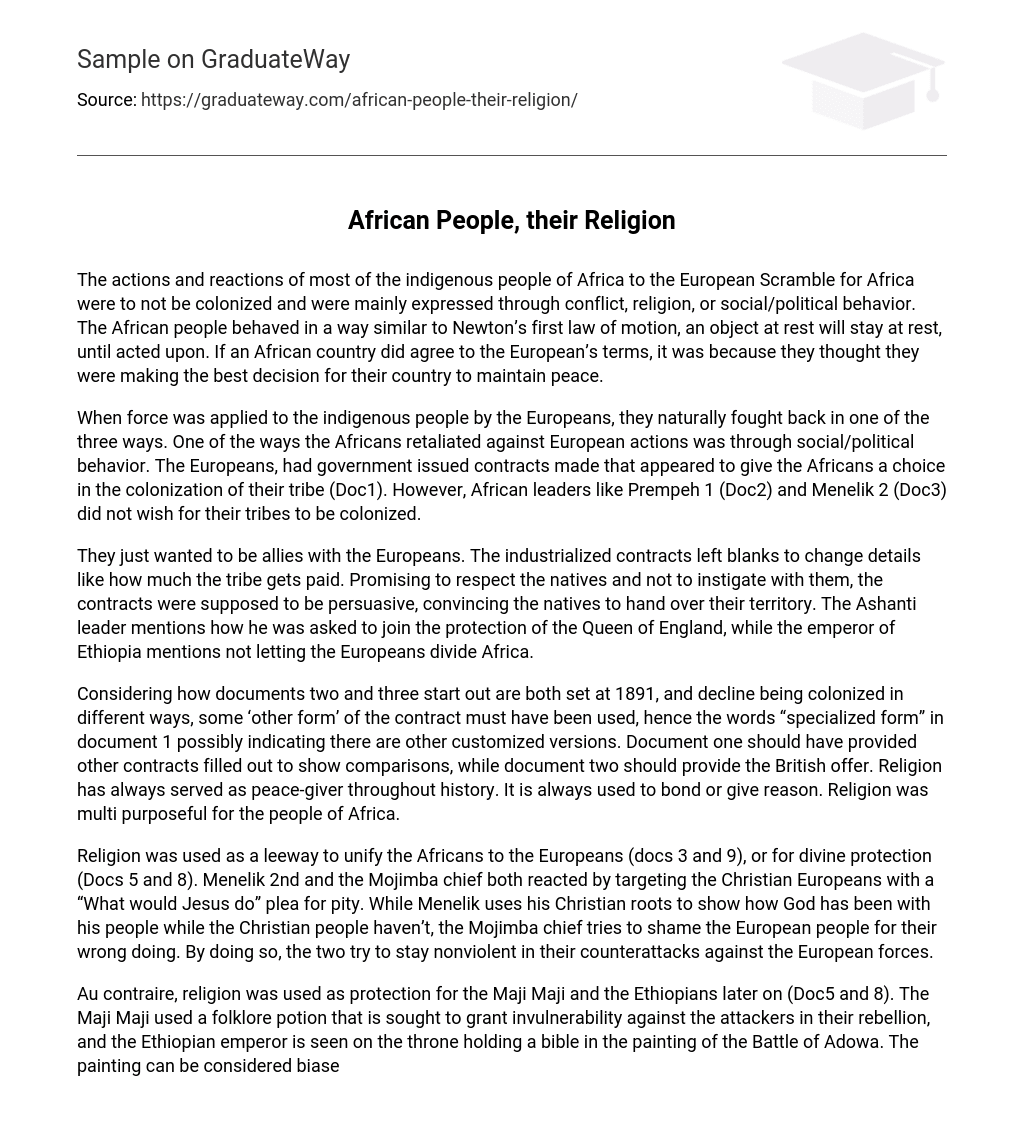The indigenous people of Africa displayed various responses to the European Scramble for Africa. Their primary objective was to resist colonization, which they expressed through conflict, religion, or social/political behavior. The African people followed a pattern similar to Newton’s first law of motion: an object at rest remains at rest until it is influenced by an external force. If an African nation did acquiesce to European conditions, it was because they believed it was the most advantageous decision to preserve peace within their country.
When the Europeans exerted pressure on the indigenous people, they naturally resisted in three different ways. One of the manners in which the Africans responded to the European actions was through engaging in social and political behaviors. The Europeans devised government contracts that seemed to offer the Africans a say in their tribe’s colonization (Doc1). Nevertheless, African leaders such as Prempeh 1 (Doc2) and Menelik 2 (Doc3) were opposed to their tribes being colonized.
The indigenous tribes sought to form alliances with the Europeans, who provided industrialized contracts that allowed for modification of key details such as payment terms for the tribe. These contracts aimed to persuade the natives by assuring respect and non-interference from the Europeans, thereby convincing them to relinquish their territories. The Ashanti leader recounts being invited to join in protecting the Queen of England, whereas the emperor of Ethiopia emphasizes the importance of not allowing European powers to divide Africa.
Both documents two and three begin in 1891 and illustrate different ways in which colonization was rejected. This suggests that there may have been alternative contracts or agreements, as indicated by the term “specialized form” in document 1, implying the existence of other customized versions. Document one should have presented additional completed contracts for comparison, while document two should have included the British offer. Religion has consistently played a role as a peacemaker throughout history, serving to unite or provide justification. In Africa, religion served multiple purposes for its people.
The Europeans used religion as a means to bring the Africans together (docs 3 and 9) or seek divine protection (Docs 5 and 8). Both Menelik 2nd and the Mojimba chief responded by appealing to the Christian Europeans using the phrase “What would Jesus do” in order to evoke compassion. Menelik relied on his Christian background to demonstrate how God has supported his people while the Christian Europeans have not, while the Mojimba chief attempted to shame the Europeans for their wrongdoing. In doing so, both leaders aimed to respond peacefully to the European forces.
Religion served as a safeguard for both the Maji Maji and the Ethiopians (as shown in Doc5 and 8). The Maji Maji relied on a mythical elixir believed to grant them immunity against their adversaries during their uprising, while the Ethiopian ruler is depicted holding a bible in the painting of the Battle of Adowa. However, it should be noted that this painting may be biased since history tends to be written by the victors, and the image stems from an Ethiopian perspective, potentially embellishing the events. Many African tribes turned to religion either to avoid conflicts or to seek protection amidst warfare.
The religious beliefs held by some Africans may explain why they believed they could resist the Europeans. The colonization of African tribes often resulted in war as a natural consequence. Documents 4, 5, 6, and 7 depict the harsh and oppressive actions of the Europeans. Tricked or deceived into practical slavery and imprisonment, many African tribes chose to rebel against the European powers. The African people were frequently engaged in battles (Docs 4 and 5), or they were rallying their comrades to prepare for warfare (Docs 6 and 7). Across various colonies worldwide, it was not uncommon for colonizers to mistreat and attack the local populace without reason. Additionally, it was typical for people to give up fighting once they realized there was no hope, as the Ashanti men likely felt after their king was captured. However, it is important to note that just because the Africans may not have been individually strong enough does not mean they wouldn’t be capable of strength when united. Document 7 illustrates Samuel’s attempt to incite an uprising throughout Africa in order to drive out the Europeans.
The African people, as a whole, began losing hope in the 1900s as they witnessed numerous killings of their fellow brethren. The purpose of Document 6 is to showcase the attitudes of the people, primarily men, towards the capture of their king and their reasons for refusing to engage in combat. In response to the European scramble for Africa, the African people sought to preserve the peace and stability of their community by any means necessary. This included resorting to warfare, religion, or social political activism in an attempt to resist. When peaceful negotiations or religious protection failed, war became the last option.
Evidence suggests that colonization attempts in Africa, with the exception of Ethiopia, were unsuccessful due to border redrawings that disrupted ethnic groups and brought together warring tribes. The colonization had both positive and negative effects on the continent, but overall it was better off before. It would have been helpful to have documents from ordinary people and Europeans, as most of the current documents (1, 2, 3, 6, 7, 8, and 9) mainly originate from important individuals. Only documents 2, 3, 4, 5, 6,
7,and
9 come from Africans. Moreover,
there is a lack of perspectives from vendors that could provide insights into potential economic changes.





